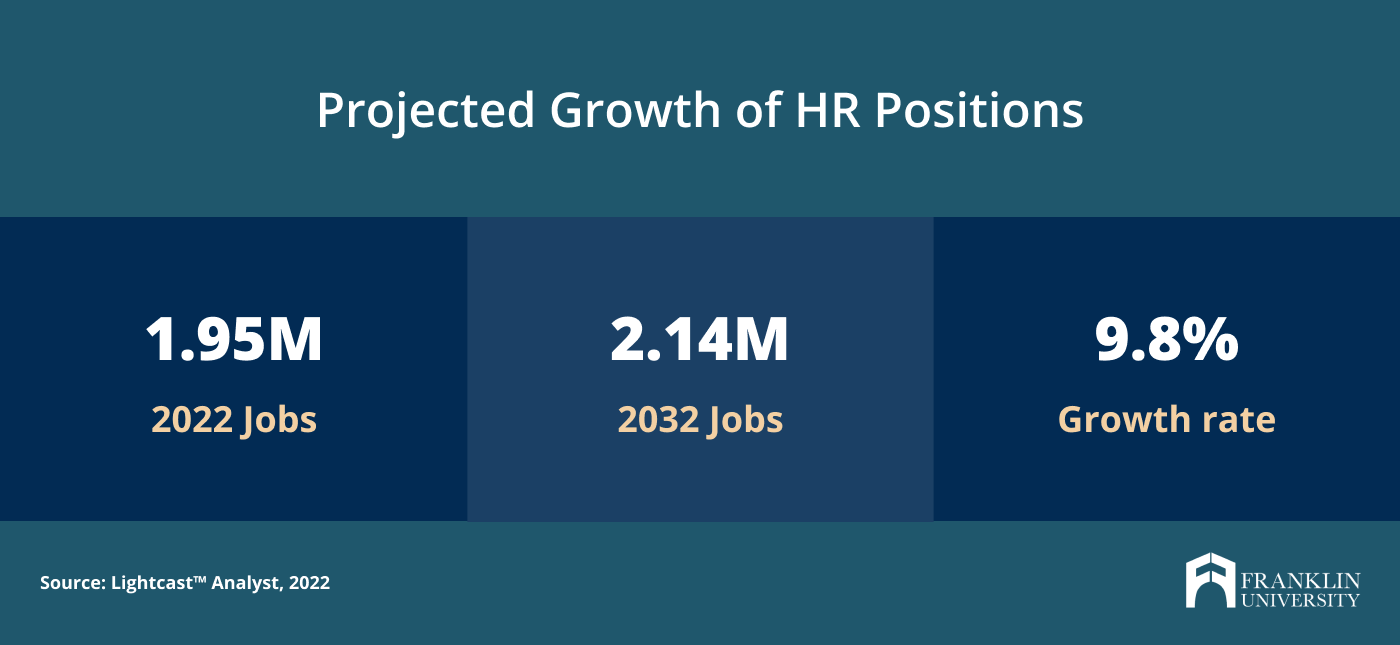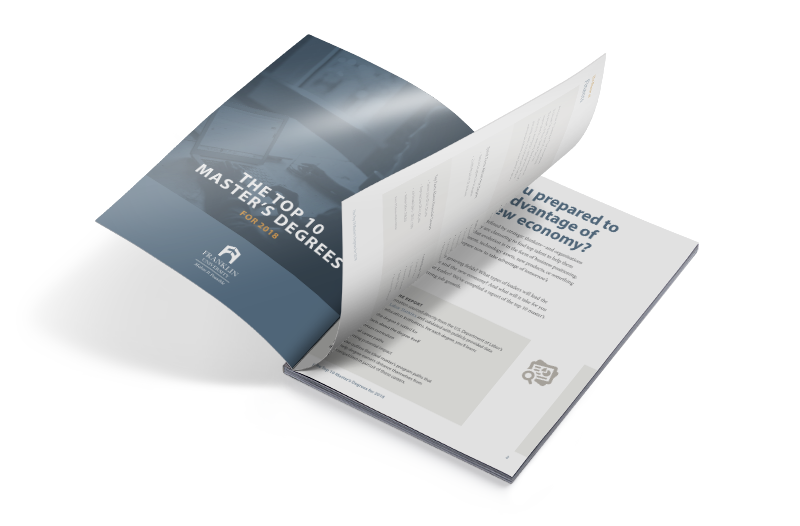Request Information
We're Sorry
There was an unexpected error with the form (your web browser was unable to retrieve some required data from our servers). This kind of error may occur if you have temporarily lost your internet connection. If you're able to verify that your internet connection is stable and the error persists, the Franklin University Help Desk is available to assist you at helpdesk@franklin.edu, 614.947.6682 (local), or 1.866.435.7006 (toll free).
Just a moment while we process your submission.

What Are the Benefits of an MBA in HR?
Effective people management is essential to any company’s success—especially in today’s highly competitive talent market. That means that skilled human resources leaders are more important than ever. According to Lightcast, a leading labor analytics firm, analysts predict that the number of human resources positions in the United States will grow by 9.8% over the next decade.
One way to prepare for advancement in the field of HR is by earning an MBA with a specialization in human resources. This degree will help you to stand out when applying for leadership positions and prepare you to succeed in an ever-changing business environment, with unique advantages compared to other human resources degrees.

What Is an MBA in Human Resources?
MBA programs prepare professionals to move into leadership roles in any field, with a curriculum emphasizing management skills, strategic thinking and business principles.
MBAs with a specialization in HR provide a solid foundation in business and management, with a particular focus on human resources strategies and challenges. Like most MBA programs, MBAs in HR typically take one to two years to complete. Franklin’s online MBA in HR is designed for working professionals, with a program that can be completed in as few as 12 months.
What matters most when choosing a master’s program? Compare features, benefits and cost to find the right school for you.
Top 6 Benefits of an MBA in Human Resources
An MBA in human resources offers numerous benefits for professionals at all stages of their careers. These include:
- Gain broad knowledge of business strategy and principles
Since MBAs in HR include coursework across management, strategy and operations, you’ll be well-prepared to take on roles that encompass both human resources and general business oversight. - Learn to create effective talent management programs
Most MBAs only cover human resources considerations at a high level. An MBA in HR provides research-backed tactical knowledge about hiring, developing and retaining top-notch talent, skills that can help you set your company apart from the competition. - Build change management skills
Fast-evolving technology and business imperatives mean that change is a constant for most businesses. MBA in HR graduates are prepared to lead their organizations’ employees through transitions while minimizing disruption and maximizing performance. - Understand legal and compliance issues
Employment law is complex and varies significantly by state and jurisdiction. To lead in a human resources role, professionals need to understand the nuances of legal and compliance requirements in their industry. MBA in HR programs offer an essential foundation in the principles of employment law and teach professionals how to manage common issues. - Prepare for leadership positions
In many corporations, an MBA is a prerequisite for joining the executive leadership team. An MBA in HR will give you the practical skills to take on people management roles with increasing responsibility, all the way up to chief human resources officer. - Increase your earning potential
According to Lightcast, for mid to senior-level HR jobs with salaries publicly advertised in 2022, the median salary for jobs requiring an MBA was $116,000, while the median advertised salary for jobs requiring a bachelor’s degree was $90,500. That gap can grow even larger as you qualify for increasingly senior positions, making an MBA in HR an investment of time and money with significant ROI.
What’s the Difference Between an MBA in HR and a Human Resources Master’s Degree?
Many professionals who hope to advance in the human resources field choose between an MBA in HR and a human resources master’s degree. While both degrees offer valuable growth opportunities, they have important differences.
Human resources master’s degree programs focus narrowly on the technical aspects of HR, ranging from recruiting to compliance. While these degrees offer effective preparation for specific HR positions, they offer less coursework related to general business and leadership principles.
MBA in HR programs, on the other hand, are general business administration degrees tailored to focus on specific HR concerns.
“An MBA with a specialization in human resource management combines HR and management topics,” explains Dr. Kristin Martin, chair of Franklin’s MBA program. “Topics learned include, but are not limited to, employee relations, compensation, training, recruiting and strategy. An MBA in human resources is for individuals who are interested in HR as well as business leadership and management in general.”
The choice between the two degrees is personal, depending entirely on your individual interests and goals. If you know you want to focus specifically on HR roles, a master’s degree in HR may make sense. If you hope to advance to advanced leadership positions or the executive level, however, an MBA may prove to be a wiser long-term decision.

What Jobs Can I Get with an MBA in HR?
MBAs in HR can offer a launchpad into a wide range of careers, including both specific HR positions and broader business strategy roles. According to Lightcast’s survey of human resources roles advertised with salaries in 2022, roles for MBA-holders included:
Vice President of Human Resources
- Median advertised salary with an MBA: $175,000
A VP of human resources oversees the HR function for the organization. They work with the company’s leadership team to develop HR strategies that support broader organizational goals and set priorities for the human resources department.
Director of Human Resources
- Median advertised salary with an MBA: $107,400
A director of human resources typically reports to the HR VP and is responsible for running the daily operations of the human resources function in a business unit or across the organization. They work closely with the vice president to implement the executive team's strategies.
Training and Development Manager
- Median advertised salary with an MBA: $88,300
Training and development managers oversee teams of staff that create and conduct training and professional development programs within the company. These professionals are tasked with helping individuals build relevant skills, which in turn helps the organization meet its objectives.
Human Resources Manager
- Median advertised salary with an MBA: $87,800
Human resources managers oversee teams within the human resources function or run HR for a specific business unit. These employees manage a team and support the organization’s broader human resources goals.
Compensation and Benefits Manager
- Median advertised salary with an MBA: $120,100
Compensation and benefits managers work to ensure that their organization’s salary and benefits offerings are fair, equitable and competitive with the market. They conduct regular market research to stay abreast of industry trends and work to keep employees engaged and satisfied.
Change Management Consultant
- Median advertised salary with an MBA: $115,200
Change management consultants work independently or with a consulting firm to help organizations apply a structured methodology to significant shifts or initiatives. For example, they might help a company plan to implement a digital transformation initiative or help a leadership team work through organizational restructuring.
Move Your Career Forward with an MBA in HR from Franklin
You’re ready to advance your career—and Franklin is ready to help you take the next steps, with eight MBA start dates each year. Our fully online program is designed for busy working adults and can be completed in as few as 12 months without sacrificing your personal or professional life.
Franklin’s MBA in HR instructors are leading practitioners in the field who teach with a theory-to-practice approach. That means that you won’t just learn about HR best practices—you’ll also apply them throughout your studies through experiential case studies and analyses. When you graduate, you’ll be ready to meet the challenges of an HR leadership role in any industry.
Learn more about how an MBA in HR at Franklin can help you meet your goals.





